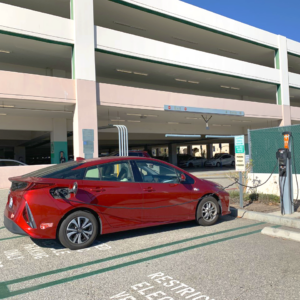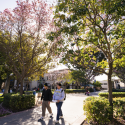Drive Electric! More EV Charging Ports Available to Campus and Surrounding Community
 If you’ve ever driven through the Fullerton College parking structure you’ve probably noticed several spaces for Electric Vehicle charging. Fullerton College has been making important strides in helping set a foundation for more sustainable practices, which has led to the addition of 44 new EV charging ports in the parking structure, bringing the campus total to 50 EV charging ports.
If you’ve ever driven through the Fullerton College parking structure you’ve probably noticed several spaces for Electric Vehicle charging. Fullerton College has been making important strides in helping set a foundation for more sustainable practices, which has led to the addition of 44 new EV charging ports in the parking structure, bringing the campus total to 50 EV charging ports.
The college is excited to celebrate these important contributions as California becomes the first state in the nation to move toward 100 percent zero-emission vehicle sales by 2035. This week, the nation is also celebrating National Drive Electric Week – a campaign to raise awareness of the many benefits of all-electric and plug-in hybrid cars, trucks, motorcycles, and more.
At Fullerton College, the EV charging stations are not only a service to students and members of the campus community, but are also available to anyone in the surrounding community. The only requirement is a valid parking permit for up to two hours of charging. One-day permits are available at a low cost of $3 per day and can be purchased at the Campus Safety office or at any of the parking lot, permit kiosks. This service provides students, faculty, staff and community members a low-cost solution to EV charging.
Plans are also underway to install more EV charging ports in other areas of campus, said Interim Sustainability Director Tyler Deacy.
“Following the 2022 ruling from the California Air Resources Board requiring all new car sales in the state be zero-emissions vehicles by 2035, we are working to ensure that Fullerton College has the proper charging infrastructure to meet the demand of its students as they make the transition,” Deacy said.
“There are 50 charging ports available to students and the community, with an additional 44 ports set to be added south of Chapman Avenue to meet increasing demand. Beyond this, we will continue to monitor and scale up our charging capacity to meet the evolving climate of personal transportation and the needs of our students,” Deacy said.
Deacy is a member of the college’s Sustainability Committee, which is tasked with planning and implementing initiatives via policy and data-driven benchmarking. The Sustainability Committee is also working with the Office of the Vice President of Administrative Services to plan campus projects that promote and enhance sustainability and reduce the college’s environmental impact.
“The committee is working to improve green spaces on campus, develop an action plan based on the college’s STARS Report (Sustainability, Tracking, Assessment & Rating System), and advocate for the divestment of fossil fuels at the state level,” Deacy said.
Fullerton College’s EV charging ports are just one of the many ways Fullerton College continues to develop sustainable practices. To learn more about other projects of the Sustainability Committee, visit the Sustainability website.






